Returning to school after a break can bring a mix of excitement and anxiety. Whether you’re a student, educator, or parent, understanding the emotional landscape of the back-to-school season is crucial for fostering a healthy and productive environment. This guide offers practical tips and strategies to help students balance their academic responsibilities with their mental well-being.
The Importance of Mental Health in Education
Mental health is foundational to overall well-being and academic success. Students who prioritize their mental health are more likely to engage positively with their studies, build strong relationships, and face challenges with resilience. Here are some key benefits of maintaining good mental health:
- Improved Concentration: When students manage stress effectively, they can focus better on their studies.
- Enhanced Memory: Reduced anxiety leads to better retention of information.
- Positive Relationships: Good mental health fosters stronger peer and teacher relationships.
- Overall Well-being: Balanced mental health contributes to physical health and happiness.
Strategies for Students
1. Establish a Routine
Having a consistent daily schedule can provide structure and reduce anxiety. Include time for:
- Study Sessions: Break down study time into manageable chunks.
- Physical Activity: Exercise releases endorphins and reduces stress.
- Relaxation: Incorporate activities like reading, meditation, or hobbies.
- Sleep: Aim for 7-9 hours of sleep each night to ensure optimal brain function.
2. Set Realistic Goals
Break down your academic goals into smaller, achievable tasks. This approach can prevent feelings of being overwhelmed and give you a sense of accomplishment as you complete each step.
3. Connect with Peers
Maintaining social connections is vital for emotional support. Join study groups, participate in school clubs, or simply spend time with friends to build a supportive network.
4. Practice Mindfulness
Mindfulness techniques, such as deep breathing exercises, meditation, and journaling, can help manage stress and improve focus.
5. Seek Help When Needed
It’s important to recognize when you’re struggling and seek support. Talk to a trusted teacher, counselor, or mental health professional if you need assistance.
Tips for Educators
1. Create a Supportive Environment
Foster a classroom culture where students feel safe to express their thoughts and emotions. Encourage open communication and show empathy towards their experiences.
2. Recognize Signs of Stress
Be vigilant for signs of stress or anxiety in students, such as changes in behavior, withdrawal, or declining academic performance. Address these concerns promptly and compassionately.
3. Integrate Mental Health Education
Incorporate lessons on mental health and well-being into the curriculum. Teaching students about coping mechanisms and emotional intelligence can equip them with tools for life.
4. Provide Resources
Ensure students have access to mental health resources, including school counselors and external support services. Make information readily available and encourage students to utilize these resources.
Advice for Parents
1. Communicate Openly
Maintain an open line of communication with your children. Regularly check in on their emotional and academic well-being, and encourage them to share their concerns.
2. Support Healthy Habits
Promote a balanced lifestyle that includes proper nutrition, regular physical activity, and sufficient sleep. Model these behaviors to reinforce their importance.
3. Encourage Breaks
Remind your children to take breaks and relax. Over-scheduling can lead to burnout, so ensure they have time to unwind and pursue interests outside of academics.
4. Be Involved
Stay engaged with your child’s education by attending school events, talking with teachers, and monitoring their academic progress. Your involvement shows that you value their education and well-being.
Balancing academic responsibilities with mental health is a critical challenge for students, but with the right strategies and support, it’s entirely achievable. By establishing routines, setting realistic goals, practicing mindfulness, and seeking help when needed, students can thrive both academically and emotionally. Educators and parents play a pivotal role in this process, providing the necessary support and resources to foster a healthy learning environment.
Remember, mental health is just as important as academic success. Let’s work together to ensure our students not only excel in their studies but also enjoy a fulfilling and balanced life.




